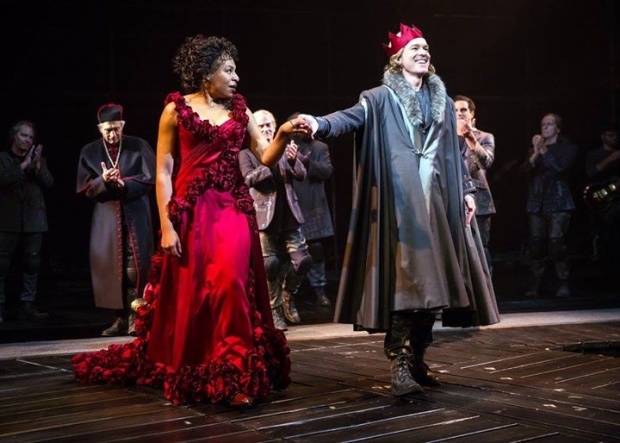Tug of War: Civil Strife
Chicago Shakespeare Theater’s Histories marathon concludes with gusto.

(© Liz Lauren)
There's nothing like a sequel that's better than the original. This spring, Chicago Shakespeare Theater brought us Tug of War: Foreign Fire, a six-hour amalgam of Edward III, Henry V, and Henry VI, Part 1. It was ambitious, but it ultimately failed to deliver on its potential. Now we have returned to the struggle for the English throne, and happily, Tug of War: Civil Strife has succeeded where its predecessor could not.
Combining Parts 2 and 3 of Henry VI and Richard III, Civil Strife is better paced than its predecessor. Foreign Fire, which lagged as it told the story of the Hundred Years' War, a cyclical power struggle without any forward momentum. A less-ambitious scope here proves to be this production's greatest strength, and the off-putting repetition is all but gone. It helps that the characters are given time to develop, and rather than periodically leaping ahead by generations, the action moves along at a steady pace.
The first several hours of Civil Strife are dedicated to the ill-conceived marriage of Henry VI and Margaret of Anjou (the gently regal Steven Sutcliffe and the commanding Karen Aldridge ), and the ambitions of the Duke of York (a deliciously seething Larry Yando) to the throne. A brazenly partisan interlude portrays populist rebel Jack Cade in unmistakable Donald Trump regalia, complete with orange skin and puckered lips. As the Yorks usurp power from the Lancasters, focus is turned to Richard, the Duke's devious and misshapen third son (Timothy Edward Kane). Richard III is unsurprisingly the centerpiece of Civil Strife, and it is fascinating to follow Richard's development throughout the three plays. Kane begins the performance as a more robust and virile Richard than one usually sees, and watching his slow transition into decrepit villainy is one of the great benefits of the play's six-hour length.
Other standouts in the 18-person ensemble include Aldridge, as Margaret of Anjou, and Michael Aaron Lindner, double-cast as Humphrey Lord Protector and King Edward IV. Elizabeth Ledo is especially versatile as she plays the ambitious Duke of Somerset, the young, fiery Prince Edward, and the Prince's own widow, the bereaved Lady Anne, who is forced into matrimony by the devious Richard.
Appropriately for this more maturely realized play cycle, director-adapter Barbra Gaines and her production team have shifted the action from the playground to the boardroom. While the tire swings and paper crowns of Foreign Fire are present, the players seem to have grown up, trading their abstract, brightly colored robes for suit jackets and MBA-worthy haircuts. When at war, they don contemporary battlefield attire. While Shakespeare in flak jackets has become an all-too-familiar trope, Susan E. Mickey's costume design has some unexpected touches, like Henry's (and later, Edward's) gorgeous kingly cloak that perfectly adds a Plantagenet touch to Wall Street style.
The costumes are not all that have been upgraded. The plank-and-board simplicity of Scott Davis's set has been offset by a towering wall of steel and glass, calling to mind a skyscraper. As the war wages on, the wall takes on blood in an impressive feat of design and engineering, though it is a bit heavy-handed thematically. As in "Foreign Fire", massive battles are effectively represented by blinding blasts of light, courtesy of Aaron Spivey's lighting design, and the hellish soundscapes of Lindsay Jones, who also provides musical arrangement for the four-piece rock band that accompanies the action.
Civil Strife does not depend on the context of Foreign Fire." Indeed, while they may have been designed to run in repertory, Civil Strife might stand best alone. It is an improvement in every way, and it is very satisfying to see a production that is worthy of the sum of its parts.









